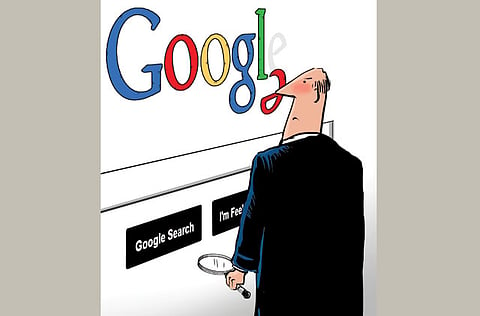Google and competition seeking middle ground
Online search company’s size means it must act responsibly

Some time later this month we are expecting the European commission to decide how it will proceed with its investigation of the search giant Google, following the latter’s submission of proposed remedies at the end of January over allegations that it has engaged in a range of anticompetitive practices. For more than two years now the commission has been examining complaints from a rising number of companies — 21 formal complaints at the last count and reportedly hundreds of other submissions. The alleged practices include biasing the search results to promote its own interests and preventing advertisers from running a single campaign across multiple platforms. There is no doubt that Google, with more than 90 per cent of the search market in Europe, is overwhelmingly dominant. In the fast-growing and possibly even more important market for searches on mobile devices, its share is even higher. Any company with such power has a “special responsibility” in European law not to throw its weight around in a way that limits competition.
Google is a global company and its activities will require a global solution. Earlier this year the US Federal Trade Commission (FTC) finally closed its own investigation into Google. Unfortunately that case ended in disarray, with conflicting statements by the five commissioners. The overall sense was that most of them had serious problems with Google’s behaviour but could not agree on a way forward. Instead they settled, as far as the search business is concerned, for some loose commitments about future behaviour.
In the past, Google had argued that it does not distort search results and that they are simply the product of an unbiased algorithm designed to deliver the best responses to search queries. Before the FTC, however, Google seemed to change tack, admitting that it does engineer the results and in particular gives prominence to links to its own services, but arguing that this is all in the interests of the user.
Nobody in their right minds would challenge the right of a company to improve its services and deliver what consumers want. But when a company wields such power that it is effectively the gateway to the internet, it is the duty of regulators and lawmakers to verify that power is being exercised fairly.
Google’s global revenues were £23.5 billion (Dh133.89 billion or $36.46 billion) in 2011. Those are its revenues before tax, although Google’s approach to tax is another and equally interesting story. Those vast revenues do not come from those who search, but from those who bid to place advertisements alongside the search results. This means that Google has a clear interest to arrange the rankings in a way that maximises its profits and faces a stark conflict of interests when it does so. It has every incentive to demote other companies, who might actually be offering answers or services that are more relevant to the user queries, and to advance its own services. Indeed, we have recently seen it move into a range of other activities such as online travel, restaurant reviews, insurance comparison, etc. When it does so, other thriving businesses, many of whom are based and pay tax in the UK, face marginalisation and business failure.
Fortunately, the European commission is well placed to deal with these issues. It has the power to intervene to protect competition and consumers across Europe, and to prevent abuse by a company with an overwhelmingly dominant position. The commissioner responsible, Vice-President Joaqun Almunia, has himself affirmed that Google seems to be biasing its results and that its behaviour must change.
Almunia has also expressed his preference for a negotiated settlement. There are obvious attractions in that approach but only if it means that the solution is reached far earlier, and only if it is sufficiently robust. In relation to search, it is essential that the remedies tackle both elements of bias, which are the unjustified demotions in search rankings of certain competitors, as well as the artificial promotion of Google’s own properties or other favoured sites. As all who use search engines will know, a search may return many pages of “answers” but few look at or click below the first four or five, and any company demoted beyond the first page is rendered practically invisible. There is no reason why an appropriate remedy that introduces fair rankings should in any way impair the user experience.
Effective remedies will aim to protect competition for the future but need also to acknowledge the past. Google has continued to expand and exploit its position during the period of the investigation and it will be necessary to find a solution that tackles that past misbehaviour and reintroduces something approaching a level playing field. Finally it will have to be legally binding, with explicit findings about Google’s market power and past abuse, of which the courts will be able to take notice.
— Guardian News and Media 2013



